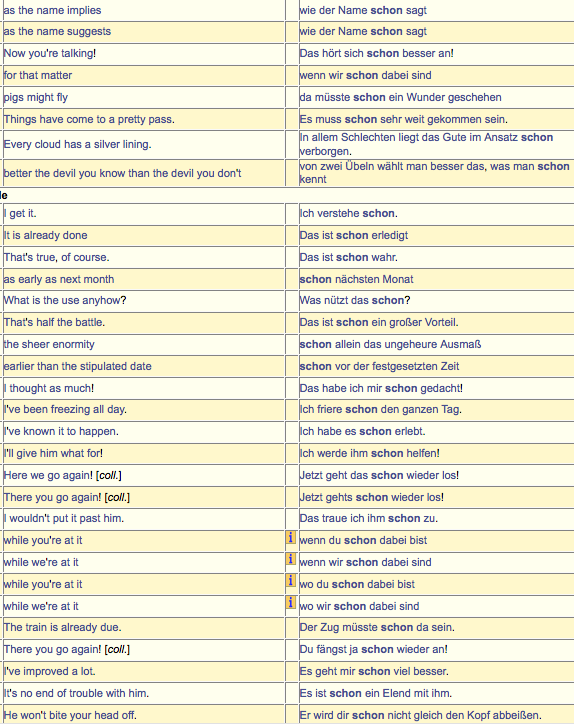Recht
Diglot
Senior Member
United States
Joined 5801 days ago
241 posts - 270 votes  
Speaks: English*, GermanB1
| Message 1 of 11 11 June 2009 at 1:51pm | IP Logged |
I've been studying German for 3.5 years, although for only 6 months in a productive
fashion. I can understand lots, but "schon" is still hard to understand.
It's a particle that can be used in practically every sentence or statement.
Can a native speaker please give examples of how this modifies, intensifies and otherwise
alters a sentence? please!
1 person has voted this message useful
|
Jar-ptitsa
Triglot
Senior Member
Belgium
Joined 5898 days ago
980 posts - 1006 votes    
Speaks: French*, Dutch, German
| Message 2 of 11 11 June 2009 at 2:15pm | IP Logged |
Hi Recht
I'm not native-speaker but I know this word "schon". It has some different meanings.
I found a nice list for you:


1 person has voted this message useful
|
Recht
Diglot
Senior Member
United States
Joined 5801 days ago
241 posts - 270 votes  
Speaks: English*, GermanB1
| Message 3 of 11 11 June 2009 at 2:18pm | IP Logged |
hey that's an excellent list! thanks very much
1 person has voted this message useful
|
TheBiscuit
Tetraglot
Senior Member
Mexico
Joined 5923 days ago
532 posts - 619 votes   
Speaks: English*, French, Spanish, Italian
Studies: German, Croatian
| Message 4 of 11 12 June 2009 at 4:51am | IP Logged |
It certainly is - where's it from Jar?
1 person has voted this message useful
|
Alpha
Diglot
Newbie
Germany
Joined 5798 days ago
22 posts - 27 votes
Speaks: German*, English
Studies: French, Japanese, Polish, Greek
| Message 5 of 11 12 June 2009 at 8:22am | IP Logged |
It looks like dict.leo.org
1 person has voted this message useful
|
mishels
Diglot
Newbie
Israel
Joined 5783 days ago
39 posts - 39 votes
Speaks: Modern Hebrew*, English
Studies: German, French
| Message 6 of 11 12 June 2009 at 11:19am | IP Logged |
"schon" in German is exactly the same as the Hebrew word "Kvar".
In English it would be "Already".
I'm not a native German speaker but I know this word.
Here are some examples how the sentences in the list really translate:
Mach schon -> Do it already (Come on!)
Schon heute -> Already today (at this stage)
Ich verstehe schon -> I already understand (I get it!)
Most of the sentences up there can be translated with already.
But then again, maybe I find it easy because I think about already as "schon" or "kvar".
1 person has voted this message useful
|
Jar-ptitsa
Triglot
Senior Member
Belgium
Joined 5898 days ago
980 posts - 1006 votes    
Speaks: French*, Dutch, German
| Message 7 of 11 12 June 2009 at 6:32pm | IP Logged |
Recht wrote:
| hey that's an excellent list! thanks very much |
|
|
You're welcome.
El Bisquito,
It's from Leo It's a great website which I use every day.
1 person has voted this message useful
|
RBenham
Triglot
Groupie
IndonesiaRegistered users can see my Skype Name
Joined 5643 days ago
60 posts - 62 votes 
Speaks: English*, German, French
Studies: Indonesian
| Message 8 of 11 20 June 2009 at 12:16am | IP Logged |
There is a fairly strong school of thought according to which many German words have a double function: as adverbs and as "modal particles" expressing an attitude on the part of the speaker. Apart from schon, these would include noch, ja, vielleicht and others.
I am not sure I share this view. However, there are certainly cases where, as a translator, you would simply ignore an adverb like schon, or try to convey what it adds to an expression in some other way.
For example, consider Das ist schon richtig! Except in rather special circumstances, you would not translate schon by "already". (You might if someone were adjusting an instrument, for example, but not generally.) The sense is just something like "That's right; stop worrying!" Similarly, in A ist schon gut, aber B ist noch besser, you would probably, if translating (not that I recommend translation as a way of learning languages; on the contrary, I think it is counterproductive), use "even" in the second clause (corresponding to noch), but nothing to correspond with schon.
Recently, an Indonesian speaker asked me to explain the name of a French diploma. I gave her a translation, and then tried to explain which word corresponded with which Indonesian word. I got stuck on de, because Indonesian uses apposition to note more or less the same thing that European languages denote by genitive or genitive-like prepositions ("of", de). Similarly, I often get the impression that German speakers feel uncomfortable with any sentence that doesn't have at least one apparently meaningless adverb.
1 person has voted this message useful
|








